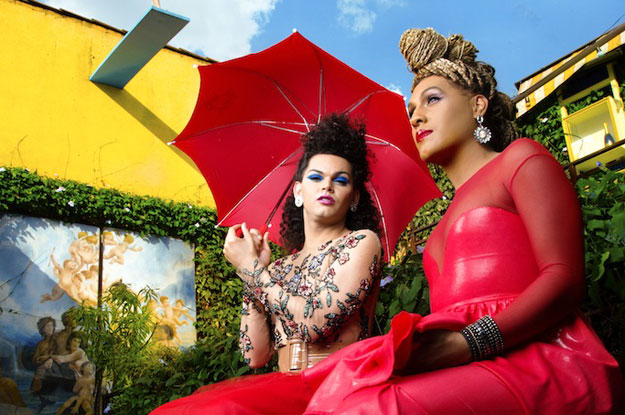It’s one thing to perform for hundreds of spectators at Salvador, Brazil’s world-famous carnaval. It’s quite another to take the stage as a transgender woman in a region that has become a focal point of rising violence against Brazil’s LGBT community.
That reality wasn’t lost on trans musicians Assucena Assucena and Raquel Virgínia as they performed in February’s carnaval in Pelourinho, Salvador’s historic center.
“What we did in Pelourinho is what every artist does – go out and sing,” Assucena told AQ. “But we know what being trans and a political minority means when we step on stage.”
For Assucena and Virgínia, the lead vocalists for the São Paulo-based band As Bahias e a Cozinha Mineira, being openly trans musicians means advocating for their community at a time when it is under threat of increasing violence and discrimination. Alongside artists like Liniker, a trans singer from the state of Minas Gerais, the duo has embraced the role of challenging dangerous stigmas against trans people with their music (which you can listen to here).
“It was really interesting to be at Salvador’s Pelourinho gaining such exposure,” Assucena said. “We need to occupy spaces to gain visibility.”
The need to be seen and respected is particularly crucial in places like Salvador in Brazil’s northeast, which saw more reported homicides against LGBT people than anywhere else in the country in 2016. Last year, the reported number of LGBT homicides nationwide reached an unprecedented 343, according to the nonprofit Grupo Gay da Bahia (GGB) (the government doesn’t keep official statistics). Less than three weeks after As Bahias e a Cozinha Mineira performed, the city was the site of one of this year’s ugliest trans homicides when Camila Albuquerque was killed on March 15. The 20-year-old’s body was found on the side of a state highway with over 15 bullet wounds and her hands tied.
Albuquerque’s murder was just one of 103 reported trans homicides that have already occurred this year throughout the country; and the real number could be even higher.
“Our figures are only the tip of an iceberg of violence,” said Luiz Mott, an anthropologist and GGB’s founder. “Death counts are underrepresented because we compile data solely from news reports and personal accounts.” Mott points to the absence of a hate crime database as evidence of what he see as the government’s “homophobia and incompetence” in preventing violence against the community.
Sayonara Nogueira, a leading coordinator of Rede Trans Brasil, a local advocacy group, echoed the need for greater awareness and accountability in light of the rise in violence against trans Brazilians. She said that authorities often try to blame crimes against trans people on causes other than their gender identity – or even on the victims themselves.
“Trans people have long been ignored,” Nogueira told AQ. “It’s as if they don’t exist.”
For Nogueira, Brazil’s trans population remains unknown to federal authorities in part because they have never been included in the country’s census.
But that invisibility may be slowly changing thanks to artists like Assucena and Virgínia. In addition to their music, the two have published a series of YouTube videos called “Nós Existimos! Visibilidade Trans” (“We Exist! Trans Visibility”), which features the duo performing dramatic interpretations of stories from LGBT Brazilians.
Assucena, meanwhile, points to a diverse and growing base of fans that are drawn to the band’s soulful, funky melodies inspired by Brazilian Tropicália music legend Gal Costa. She is confident their unique art is capable of breaking through gender taboos.
“Although there’s still a very conservative segment of society that doesn’t approve of us, we are very lucky to have even older fans that lived through dictatorship violence, who essentially turn out because they feel enfranchised by our pro-freedom attitude,” Assucena told AQ.
As Bahias e a Cozinha Mineira released their first album, Mulher (Portuguese for “woman”), in 2015 after three years of performing everywhere from local universities to renowned venues in Brazil’s major cities. “We know what it’s like to be trans and play shows to crowds of different people,” said Assucena. “What matters to us is to not be harassed for who we are.”
Of course, the musical activism of As Bahias e a Cozinha Mineira isn’t itself a solution for the violence against LGBT Brazilians. Challenges remain, particularly in politics: an anti-descrimination law has floundered in Congress in recent years, and it’s not uncommon to hear politicians of all parties use homophobic and misogynistic slurs.
But for Millena Passos, a leading trans activist in Salvador, LGBT Brazilians and their allies don’t have to wait for the rest of society to come around in order for things to improve for their communities.
“The LGBT community needs to know it’s not a minority anymore. We need to take on the role of the majority that we’ve become and empower ourselves to claim our rights.”
—
Martínez is a freelance journalist based between Mexico and Brazil








